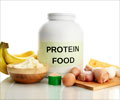Benefits of dietary protein intake for training adaptation, manipulating body composition and optimising performance in track and field athletes highlighted in a recent study.

‘Track and field athletes who are restricting energy intake - and have the goal of minimising the loss of lean body mass - should target protein intakes of between 1.6 and 2.4 grams per kilogram of body mass a day. ’





Explaining the findings, Dr Witard, of the Physiology, Exercise and Nutrition Research Group at Stirling, said: "Track and field athletes engage in vigorous training that place stress on physiological systems requiring nutritional support for optimal recovery. In this paper, we highlight the benefits of dietary protein intake for training adaptation, manipulating body composition and optimising performance in track and field athletes. "We recommend that, to facilitate the remodelling of our muscle proteins - which are turning over rapidly due to their high training volumes - track and field athletes should aim for protein intakes of around 1.6 grams per kilogram of body mass each day if their goal is to increase muscle mass."
The paper also offers guidance to those track and field athletes aiming to optimise their ratio of strength, power or endurance to body weight for a performance advantage.
The previous IAAF consensus statement was published in 2007 and, in the time since, evidence underpinning nutrition strategies for adaptation and physique manipulation in athletes has evolved considerably. The updated statement was led by Professor Louise M Burke, of the Australian Institute of Sport and Australian Catholic University.
Dr Witard added: "High-performance athletes now have access to an up-to-date consensus statement that informs best practice protein nutrition for optimising body composition."
Advertisement













